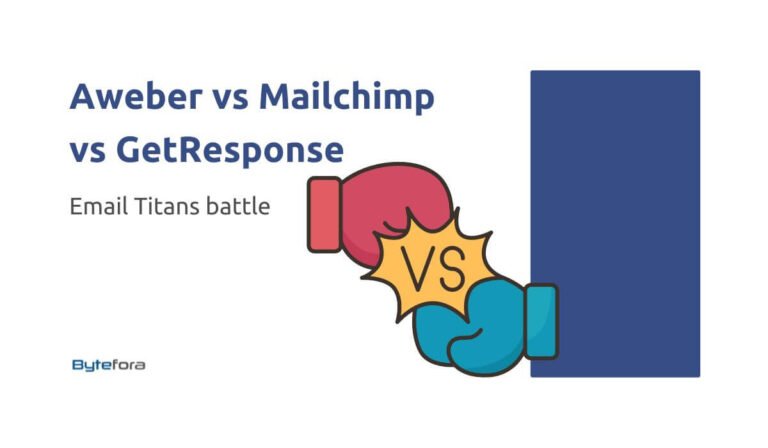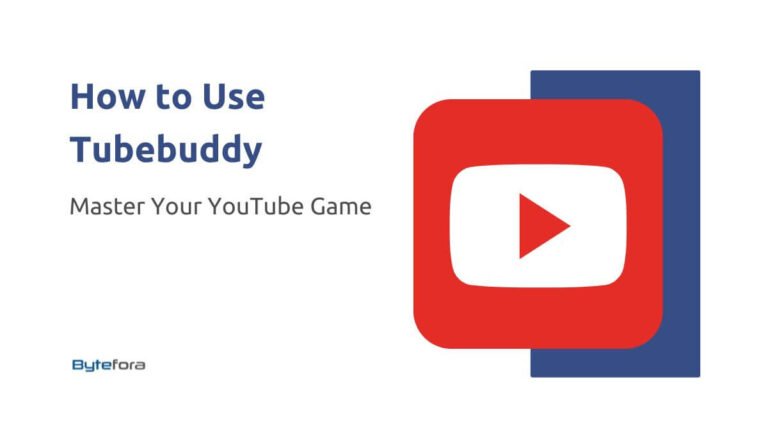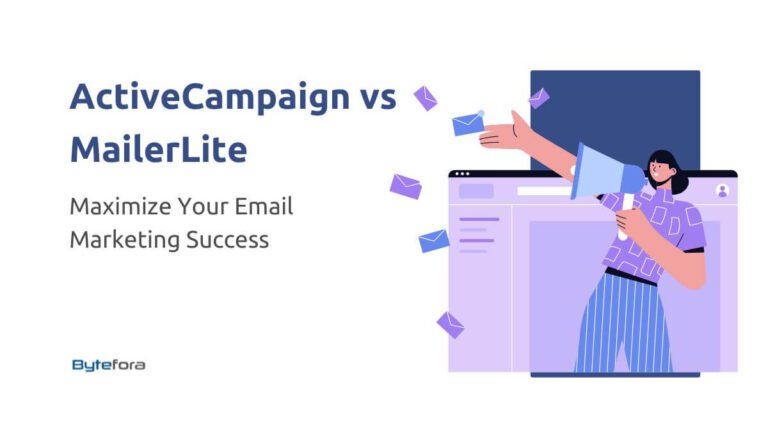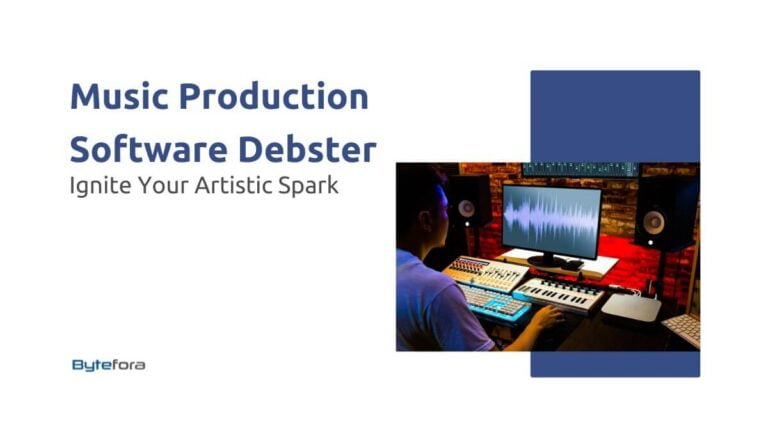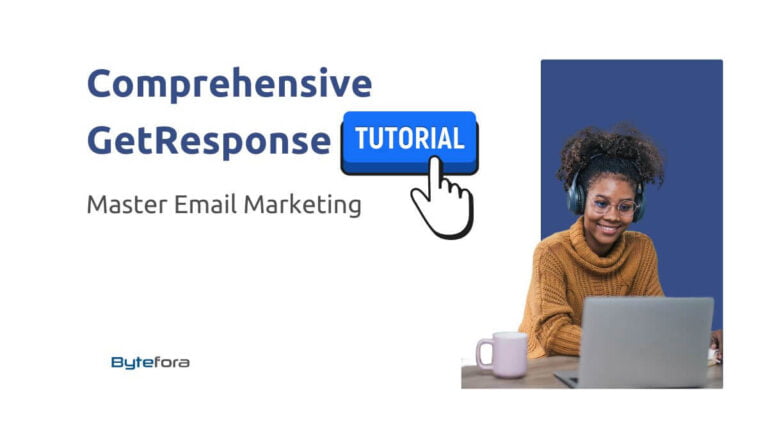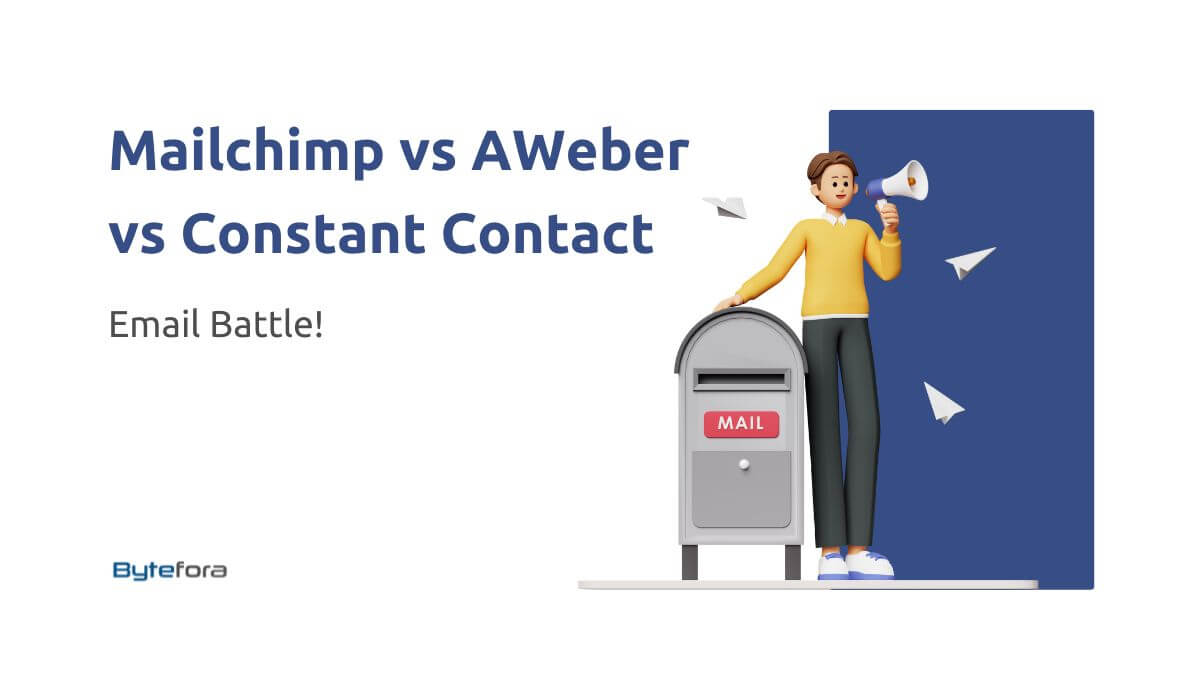
Email marketing has appeared as a cornerstone for businesses striving to establish a meaningful connection with their audience in the digital age. It acts as a powerful tool for engagement, brand building, and driving conversions. As businesses recognize the pivotal role of email marketing, choosing an email marketing platform becomes a strategic decision. In this comprehensive guide, we delve into the intricacies of three prominent players in the field: Mailchimp, AWeber, and Constant Contact.
Transitioning from the traditional marketing landscape, where businesses relied on newsletters and promotional emails sent sporadically, the modern approach to email marketing involves sophisticated platforms. These platforms streamline the process and provide valuable insights, automation, and customization options tailored to diverse business needs.
The choice can significantly impact the effectiveness of your email marketing campaigns. So, let’s embark on this journey to unravel the distinct offerings of these platforms and empower you to make an informed decision for your business.
Table of Contents
Understanding Email Marketing Platforms
To harness the full potential of email marketing, businesses must navigate the intricate landscape of email marketing platforms. These platforms serve as the digital backbone, automate processes, and optimize campaign performance.
Key Features to Look For
When evaluating email marketing platforms, certain features stand out as indispensable. Automation tools, customizable templates, analytics, and integration capabilities with other business tools are vital components that facilitate seamless operations and yield actionable insights.
Considerations for Businesses of Various Sizes and Industries
One size does not fit all in the realm of email marketing platforms. The needs of a startup differ significantly from those of an established enterprise. Similarly, the requirements of an e-commerce business may contrast with those of a service-oriented company.
Overview of Mailchimp, AWeber, and Constant Contact
Mailchimp, AWeber, and Constant Contact have emerged as frontrunners in the email marketing domain. Each platform caters to diverse businesses, offering unique features and pricing structures.
We will delve into the intricacies of each platform, unraveling their features, pricing models, and the distinct advantages and disadvantages they bring to the table. Let’s embark on this journey to demystify Mailchimp, AWeber, and Constant Contact and empower you to make the right choice for your email marketing endeavors.
Mailchimp: A Deep Dive
Let’s immerse ourselves in a comprehensive exploration of Mailchimp, a trailblazing email marketing platform with a user-friendly interface.
Overview of Features and Functionalities
Mailchimp sets itself apart with an extensive. From customizable email templates and drag-and-drop design functionality to automation workflows and detailed analytics, Mailchimp optimizes impactful email campaigns.
Pricing Structure and Plans
Understanding Mailchimp’s pricing structure is pivotal for businesses considering this platform. The platform offers a free plan with essential features and paid plans that scale according to the size and requirements of the business. The tiered pricing model ensures the company’s goals.
Pros and Cons of Using Mailchimp
While Mailchimp boasts a plethora of advantages, including a user-friendly interface, extensive third-party integrations, and robust analytics, it also has its drawbacks. Issues such as limited customer support for free users and certain complexities in workflow customization are aspects that businesses should consider when deciding if Mailchimp is the right fit for them.
AWeber: Unveiling the Platform
Dancing into email marketing media, AWeber takes center stage as a veteran, reliable choice for businesses aiming to refine their digital communication strategies. Unveiling the features of AWeber reveals a platform meticulously crafted for efficiency and impact.
In-depth Exploration of AWeber’s Features
AWeber stands out for its simplicity and extensive features that are suitable for users at various skill levels. AWeber empowers users to streamline campaign creation and optimization by boasting responsive email templates, an intuitive drag-and-drop editor, and automation capabilities.
Pricing Comparison with Mailchimp
Understanding AWeber’s pricing structure is pivotal for businesses considering this platform. AWeber offers a straightforward model based on the number of subscribers, with a free plan for a limited audience and paid plans scaling to accommodate more extensive subscriber lists. A comparative analysis of Mailchimp’s pricing structures enables businesses to make informed decisions based on budget constraints and desired features.
Strengths and Weaknesses of AWeber
AWeber’s strengths lie in its simplicity, reliable customer support, and comprehensive features suitable for businesses of all sizes. However, like any platform, AWeber has limitations, such as a less intuitive interface than some competitors. Evaluating these strengths and weaknesses empowers businesses to understand whether AWeber aligns with their needs and goals.
Constant Contact: A Comprehensive Review
Our journey through email marketing platforms leads us to Constant Contact, a powerhouse in the digital communication landscape. Let’s dive into a comprehensive review of Constant Contact, uncovering its unique features and advantages for businesses seeking an effective email marketing solution.
Detailed Examination of Constant Contact’s Features
Constant Contact positions itself as a comprehensive solution. From customizable templates and user-friendly campaign management to advanced automation and detailed analytics, Constant Contact provides a robust toolkit to elevate email marketing strategies.
Cost Analysis and Comparison with Mailchimp and AWeber
Understanding Constant Contact’s pricing model is crucial for businesses considering this platform. Constant Contact offers tiered pricing plans based on the number of subscribers, with additional features in higher-tier plans. Conducting a detailed cost analysis and comparing it with Mailchimp and AWeber allows businesses to make informed decisions based on features and budget constraints.
Noteworthy Advantages and Disadvantages of Constant Contact
Constant Contact boasts an intuitive interface, a wide array of templates, and robust customer support. However, potential drawbacks, including a steeper learning curve for advanced features, should be considered. Evaluating these advantages and disadvantages empowers businesses to determine whether Constant Contact fits their requirements.
As we explore, we’ll undertake a head-to-head comparison of Mailchimp, AWeber, and Constant Contact, offering a comprehensive analysis to guide businesses in making an informed decision. Join us in the upcoming sections as we unravel the intricate details of these three prominent email marketing platforms.
Constant Contact: A Comprehensive Review
Our exploration of email marketing platforms now leads us to Constant Contact, a formidable player in the digital communication realm. In this section, we embark on a detailed review of Constant Contact, unraveling its distinctive features and advantages for businesses seeking a robust email marketing solution.
Detailed Examination of Constant Contact’s Features
Constant Contact is a comprehensive solution catering to businesses of varying sizes. The platform offers extensive features, including customizable templates, user-friendly campaign management, advanced automation, and detailed analytics. This array equips businesses with a robust toolkit to elevate their email marketing strategies.
Cost Analysis and Comparison with Mailchimp and AWeber
Understanding Constant Contact’s pricing model is crucial for businesses considering this platform. Based on the number of subscribers, the tiered pricing plans come with additional features in higher-tier plans. Conducting a detailed cost analysis and comparing it with Mailchimp and AWeber empowers businesses to make informed decisions based on features and budget constraints.
Noteworthy Advantages and Disadvantages of Constant Contact
Constant Contact boasts advantages, including an intuitive interface, diverse templates, and robust customer support. However, potential drawbacks, such as a steeper learning curve for advanced features, should be considered. Evaluating these advantages and disadvantages empowers businesses to determine whether Constant Contact fits their requirements.
Head-to-Head Comparison
This crucial section compares the three email marketing giants: Mailchimp, AWeber, and Constant Contact. Understanding the nuances of each platform and its comparative strengths and weaknesses is paramount for businesses aiming to make an informed decision in selecting the most suitable email marketing solution.
Comparative Analysis of Key Features
Mailchimp, AWeber, and Constant Contact each bring unique features. Mailchimp shines with its user-friendly interface, automation capabilities, and extensive third-party integrations. AWeber is celebrated for its simplicity, reliable customer support, and comprehensive features. Constant Contact, on the other hand, offers advanced automation, customizable templates, and a user-friendly interface.
User Interface and Ease of Use Considerations
Mailchimp offers an intuitive and sleek interface, making it easy for users to navigate. AWeber is renowned for its simplicity, ensuring that even beginners can utilize its features effectively.
Integration Capabilities with Other Tools and Platforms
Seamless integration with different tools and platforms is vital for a cohesive digital strategy. Mailchimp, AWeber, and Constant Contact offer various integrations, but Mailchimp stands out for its extensive range. AWeber ensures compatibility with numerous third-party applications, while Constant Contact provides a solid set of integrations.
As we conclude this comparative analysis, the following sections will delve deeper into real-world experiences with case studies, providing practical insights into how businesses have successfully utilized Mailchimp, AWeber, and Constant Contact. Join us on this journey to glean valuable lessons and best practices from those who have walked this path before.
Making the Decision: Factors to Consider
Businesses are at the crossroads of choosing an email marketing platform, so a strategic decision hinges on thoroughly considering various factors. The choice between Mailchimp, AWeber, and Constant Contact requires a nuanced understanding of specific requirements, objectives, and the unique dynamics of each platform.
Factors to Weigh When Choosing
Size and Industry: Consider the size and nature of your business. What works for a startup might differ from what benefits an established enterprise. Each platform caters to different scales and industries, so aligning your choice with your business profile is crucial.
Customization Options: Assess the level of customization each platform offers. Depending on your marketing strategy, having the flexibility to tailor campaigns to your brand’s unique voice and style is paramount.
Scalability: Evaluate the scalability of the platforms. Choosing a platform that can seamlessly scale with your growth prevents disruptions and the need for frequent transitions.
Assessing Customer Support and Resources
Customer Support: In case of issues or questions, having responsive and knowledgeable support can significantly impact your overall experience.
Available Resources: Explore the resources offered by each platform. From tutorials and guides to community forums, platforms that invest in providing valuable resources contribute to a smoother user experience.
Beyond the Basics: Advanced Features and Capabilities
Advanced Features: From sophisticated automation to in-depth analytics, understanding how each platform caters to advanced email marketing strategies is crucial for businesses aiming for sophistication.
Integration Capabilities: Consider how well each platform integrates with other tools and platforms in your digital ecosystem. Seamless integration enhances the overall efficiency of your marketing efforts.
As businesses navigate these considerations, the next section will provide a closer look at the future of email marketing platforms.
Beyond the Basics: Advanced Features and Capabilities
As businesses evolve in the digital landscape, the success of email marketing strategies increasingly depends on harnessing advanced features and capabilities offered by platforms like Mailchimp, AWeber, and Constant Contact. Let’s delve into these sophisticated functionalities beyond the basics, providing businesses with the tools for cutting-edge and highly effective email marketing campaigns.
Exploring Advanced Features
Personalization and Segmentation: Advanced platforms excel in delivering personalized experiences. Features allowing detailed segmentation based on user behavior, demographics, or engagement levels enable businesses to tailor content, enhancing relevancy and engagement.
Automation Workflows: Automation is a game-changer in streamlining marketing processes. Advanced platforms offer intricate automation workflows, allowing businesses to create dynamic and personalized customer journeys. From welcome series to re-engagement campaigns, automation optimizes efficiency and results.
Integration Capabilities with Third-party Tools
CRM Integration: tools enhance the collaboration between marketing and sales efforts. This integration allows businesses to align their email marketing strategies with customer data and sales pipelines, fostering a holistic approach.
E-commerce Integration: For businesses in the e-commerce sector, integration with e-commerce platforms is crucial. This facilitates automated product recommendations, cart abandonment emails, and personalized product offerings, enhancing the shopping experience.
Advanced Analytics and Reporting
Behavioral Analytics: Platforms offering advanced analytics provide insights into user behavior beyond open and click-through rates. Behavioral analytics track user actions, allowing businesses to understand how subscribers interact with content and make data-driven adjustments.
Predictive Analytics: The integration of predictive analytics allows businesses to anticipate user behavior and preferences. This foresight enables proactive campaign adjustments, ensuring they align with evolving subscriber expectations.
We are determining which platform is the most suitable choice for businesses. Join us as we synthesize the strengths and weaknesses of Mailchimp, AWeber, and Constant Contact, guiding you toward an optimal decision for your email marketing endeavors.
The Verdict: Mailchimp vs AWeber vs Constant Contact
As we stand at the culmination of our exploration, the crucial question arises: which email marketing platform reigns supreme for businesses seeking a comprehensive and effective solution? Let’s synthesize the strengths and weaknesses of Mailchimp, AWeber, and Constant Contact, providing a decisive overview to guide you toward an optimal decision for your email marketing endeavors.
Summarizing the Strengths and Weaknesses
Mailchimp: With its user-friendly interface, extensive third-party integrations, and robust automation capabilities, Mailchimp emerges as a versatile choice.
AWeber: Renowned for its simplicity, reliable customeryr support, and comprehensive features, AWeber caters to businesses seeking an uncomplicated yet impactful email marketing solution. However, its interface may be perceived as less intuitive than some competitors.
Constant Contact: Positioned as a comprehensive solution, Constant Contact offers advanced automation, customizable templates, and a user-friendly interface. While its strengths include an intuitive interface and diverse templates, there might be a steeper learning curve for advanced features.
Final Considerations for Businesses
Tailoring to Specific Needs: The ultimate decision depends on your business’s specific needs and objectives. Mailchimp excels in versatility, AWeber in simplicity, and Constant Contact in comprehensive features. Choosing the right fit involves aligning platform strengths with your business priorities.
Scalability and Future Growth: Consider the scalability of the platforms. Mailchimp’s extensive integrations, AWeber’s simplicity, and Constant Contact’s advanced features cater to different business trajectories. Select a platform that meets current needs and aligns with your vision for future growth.
A Data-driven Approach to Choosing the Most Suitable Platform
In the quest for email marketing supremacy, a data-driven approach is paramount. Analyze your business requirements and consider scalability and specific needs. The verdict lies in making an informed decision based on a holistic understanding of how Mailchimp, AWeber, or Constant Contact aligns with your business goals.
Reimagining Email Marketing Success
As businesses navigate the dynamic landscape of digital communication, reimagining email marketing success goes beyond the choice of a platform. It involves embracing emerging trends and adopting innovative strategies.
1. Embracing Personalization at Scale
Tailoring content to individual preferences, behaviors, and demographics fosters more profound connections with your audience. Advanced platforms with robust personalization features empower businesses to deliver highly relevant and engaging content, maximizing the impact of every email campaign.
2. Leveraging Artificial Intelligence (AI) for Smarter Campaigns
The integration of AI into email marketing platforms enhances campaign intelligence. From predictive analytics to intelligent content recommendations, AI-driven insights allow businesses to anticipate subscriber behavior, automate personalized content delivery, and optimize campaigns for maximum impact. Embracing AI ensures your email marketing strategy evolves with the sophistication of your audience.
3. Interactive and Immersive Email Experiences
Static emails are making way for interactive and immersive experiences. Incorporating elements like quizzes, surveys, and interactive images engages subscribers, transforming email from a one-way communication channel into an interactive platform. Innovative features like embedded videos and gamification capture attention and provide valuable insights into user preferences.
4. Mobile-First Strategies
Transitioning from desktop-centric to mobile-centric design is imperative for reaching an increasingly reliant audience on smartphones for email consumption.
5. Compliance and Data Privacy Priorities
As data privacy regulations evolve, prioritizing compliance becomes integral to sustained success. Proactively managing and securing user data is a foundational aspect of long-term success.
Reimagining email marketing success involves selecting the right platform, staying ahead of trends, and adopting innovative strategies by embracing personalization, leveraging AI, creating interactive experiences, prioritizing a mobile-first approach, and ensuring compliance in an ever-evolving digital communication landscape.
Frequently Asked Questions (FAQ)
Which platform is the best for a small business just starting with email marketing?
For small businesses starting with email marketing, Mailchimp is often recommended for its user-friendly interface, free plan for a limited number of subscribers, and comprehensive features suitable for beginners.
What advanced features should I prioritize for a sophisticated email marketing strategy?
Prioritize personalization features, advanced automation workflows, integration capabilities with other tools, and robust analytics for a sophisticated email marketing strategy. Platforms like AWeber and Constant Contact offer a range of advanced features to support these needs.
How can I ensure GDPR compliance in my email marketing campaigns?
>Ensuring GDPR compliance involves:
>Obtaining explicit consent.
>Communicate data usage policies.
>Providing opt-out options.
>Securing user data.
>Regularly update your privacy policies and keep abreast of legal requirements to maintain compliance.
What role does mobile optimization play in email marketing success?
Ensure responsive design, concise content, and mobile-friendly calls to action for an optimal user experience.
How can I enhance engagement in my email campaigns?
To enhance engagement, focus on personalized content, strategic segmentation, compelling subject lines, and interactive elements strategy accordingly.
Are there industry-specific best practices for email marketing?
Industry-specific best practices may vary, but universal principles include personalized communication, compliance with regulations, and staying abreast of industry trends. Tailor your strategies to align with your industry’s
What is the future outlook for email marketing platforms?
The future outlook for email marketing platforms includes a greater emphasis on personalization, integration of AI for more brilliant campaigns, interactive and immersive experiences, mobile-first strategies, and a continued focus on compliance and data privacy.


